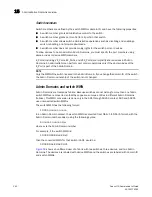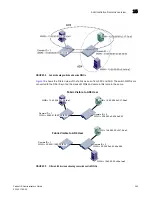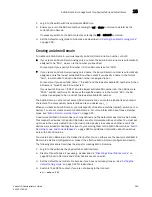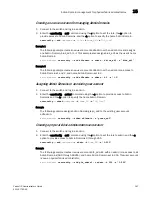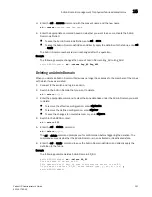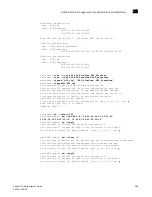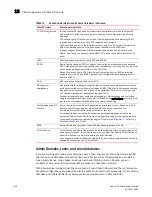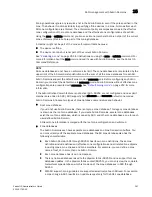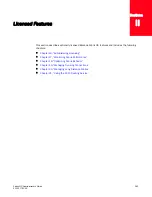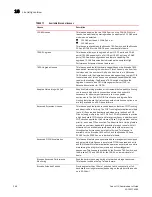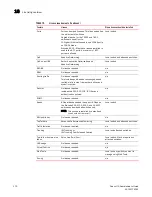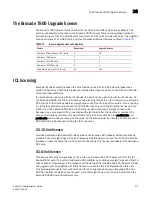
356
Fabric OS Administrator’s Guide
53-1001763-02
SAN management with Admin Domains
15
Validating an Admin Domain member list
You can validate the device and switch member list. You can list non-existing or offline Admin
Domain members. You can also identify misconfigurations of the Admin Domain.
The Admin Domain validation process is not applicable for AD0, because AD0 implicitly contains all
unassigned online switches and their devices.
1. Connect to the switch and log in as admin.
2. Switch to the AD255 context, if you are not already in that context.
ad --select 255
3. Enter the ad
--
validate command.
ad --validate
ad_id
-m
mode
If you do not specify any parameters, the entire AD database (transaction buffer, defined
configuration, and effective configuration) is displayed.
If you do not specify an Admin Domain, information about all existing Admin Domains is
displayed.
The -m
mode
option can be used as follows:
•
0 to display the Admin Domain configuration in the current transaction buffer.
•
1 to display the Admin Domain configuration stored in the persistent memory (defined
configuration).
•
2 to display the currently enforced Admin Domain configuration (effective configuration).
Example
The following example validates the member list of Admin Domain 10 in the current
transaction buffer.
switch:AD255:admin>
ad --validate 10 –m 0
Current AD Number: 255 AD Name: AD255
Transaction buffer configuration:
---------------------------------
AD Number: 2
AD Name: ad2
State: Active
Switch port members:
1,1; 1,3; 2,5+; 3,6;
----------------------------
* - Member does not exist
+ - Member is AD Unaware
SAN management with Admin Domains
This section is for both users and administrators and describes how Admin Domains affect
commands and other Fabric OS features. If you are a physical fabric administrator and you want to
create, modify, or otherwise manage Admin Domains, see
“Admin Domain management for
physical fabric administrators”
on page 344.
The Admin Domain looks like a virtual switch or fabric to a user. However, based on the user role
and type (User_ID), users are presented with only their relevant AD-based views (see
Figure 51
on
page 336 and
Figure 52
on page 336). Any devices and switch ports that are not defined as part of
the Admin Domain are not shown and are not available to that AD user.
Summary of Contents for 53-1001763-02
Page 1: ...53 1001763 02 13 September 2010 Fabric OS Administrator s Guide Supporting Fabric OS v6 4 0 ...
Page 4: ...iv Fabric OS Administrator s Guide 53 1001763 02 ...
Page 24: ...xxiv Fabric OS Administrator s Guide 53 1001763 02 ...
Page 28: ...xxviii Fabric OS Administrator s Guide 53 1001763 02 ...
Page 32: ...xxxii Fabric OS Administrator s Guide 53 1001763 02 ...
Page 40: ...xl Fabric OS Administrator s Guide 53 1001763 02 ...
Page 42: ...2 Fabric OS Administrator s Guide 53 1001763 02 ...
Page 54: ...14 Fabric OS Administrator s Guide 53 1001763 02 High availability of daemon processes 1 ...
Page 74: ...34 Fabric OS Administrator s Guide 53 1001763 02 Basic connections 2 ...
Page 102: ...62 Fabric OS Administrator s Guide 53 1001763 02 Audit log configuration 3 ...
Page 214: ...174 Fabric OS Administrator s Guide 53 1001763 02 Management interface security 7 ...
Page 228: ...188 Fabric OS Administrator s Guide 53 1001763 02 Brocade configuration form 8 ...
Page 276: ...236 Fabric OS Administrator s Guide 53 1001763 02 Creating a logical fabric using XISLs 10 ...
Page 404: ...364 Fabric OS Administrator s Guide 53 1001763 02 ...
Page 440: ...400 Fabric OS Administrator s Guide 53 1001763 02 Performance data collection 17 ...
Page 480: ...440 Fabric OS Administrator s Guide 53 1001763 02 F_Port masterless trunking 19 ...
Page 494: ...454 Fabric OS Administrator s Guide 53 1001763 02 Buffer credit recovery 20 ...
Page 574: ...534 Fabric OS Administrator s Guide 53 1001763 02 Hexadecimal overview E ...

